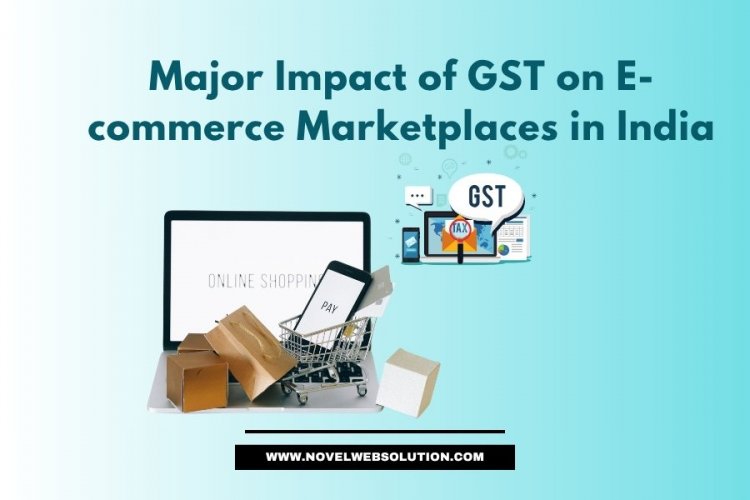Major Impact of GST on E-commerce Marketplaces in India

Since its implementation in July 2017, the Goods and Services Tax (GST) has significantly reshaped the landscape of India's business environment — and e-commerce marketplaces have been no exception. The online retail industry, which was growing rapidly with increased internet penetration and digital payments, faced both opportunities and challenges due to the new tax regime. From seller compliance to tax collection, the introduction of GST brought transparency, uniformity, and a fair competitive edge. However, it also introduced complexities that required specialized handling — paving the way for a surge in demand for eCommerce account management services. In this blog, we explore the major impact of GST on eCommerce marketplaces and why businesses are now more inclined to hire professional services for managing their online tax obligations.
Major Impact of GST on E-commerce
Discover the major impact of GST on e-commerce marketplaces in India and how it has affected pricing, discounts, and more. Learn how e-commerce platforms are adapting to the new tax regime.
Unified Tax System Replacing Multiple Indirect Taxes
Before GST, e-commerce sellers had to deal with a mix of state-level VAT, central excise, and service taxes — leading to confusion and compliance issues. GST replaced these with a single unified tax, reducing complexity in inter-state sales and making it easier for online sellers to expand nationwide.
Impact: This simplification boosted confidence among small and medium online sellers, encouraging them to expand on platforms like Amazon, Flipkart, and Meesho.
Mandatory GST Registration for All Online Sellers
Unlike offline businesses that enjoy turnover-based exemptions, all eCommerce sellers are required to register under GST, regardless of turnover. This rule is in place because online sales are interstate in nature, which automatically triggers compulsory registration.
Impact: Many small-scale sellers were caught off guard by this requirement. Here, expert eCommerce account management services stepped in to assist sellers in registering, filing returns, and maintaining GST compliance.
TCS (Tax Collected at Source) by Marketplaces
Under GST law, marketplaces like Amazon and Flipkart must collect TCS (Tax Collected at Source) at 1% on the net value of taxable supplies made through them. This collected amount is deposited with the government and reflected in the seller’s electronic cash ledger.
Impact: Sellers need to reconcile TCS data monthly, making GST filing more complex. Inaccuracies can lead to compliance penalties and blocked working capital. This has further increased the demand for professional amzone, flipkart, meesho and other platfrom account managers who handle eCommerce tax reconciliation efficiently.
Increased Compliance Burden
GST introduced several monthly and annual returns like GSTR-1, GSTR-3B, GSTR-9, etc., which require regular filing and reconciliation. Sellers often sell across multiple platforms and locations, making it difficult to consolidate data manually.
Impact: The risk of errors or missed filings can lead to late fees or input credit issues. This is why more sellers today outsource their bookkeeping and GST work to eCommerce account management services for stress-free compliance.
Transparency and Anti-Evasion Measures
GST implementation ensured better tax transparency across eCommerce platforms. With digital tracking, the government can now monitor sales, returns, and tax liabilities in real-time, reducing the scope of tax evasion.
Impact: This has leveled the playing field between registered and unregistered sellers. Honest sellers now find a more structured and trustworthy environment to grow their business.
Restriction on Composition Scheme
The GST Composition Scheme — meant to simplify tax for small businesses — is not available to eCommerce sellers. This means online sellers cannot pay a flat rate of tax and must comply with regular GST filings.
Impact: This discourages very small sellers from joining online marketplaces unless they’re ready to comply with the full GST regime. For those who want to stay competitive, eCommerce accounting experts are critical in managing these legal requirements.
Impact on Product Pricing and Profit Margins
GST brought a unified tax rate across categories but also made pricing strategies more intricate. Sellers had to restructure their product prices and update HSN codes as per GST slabs to avoid overcharging or undercharging customers.
Impact: Misclassification can lead to legal scrutiny or profit loss. With eCommerce account management services, sellers can ensure product listings and invoicing are compliant with the latest GST norms.
Return Processing and Inventory Management
GST has a direct impact on how returns and cancellations are handled. Taxes must be adjusted through credit notes, and inventory needs to be accounted for accurately.
Impact: This creates a need for accurate real-time inventory tracking and tax adjustment — services that are efficiently handled by professional eCommerce bookkeeping and GST support teams.
Final Thoughts
The introduction of GST in the eCommerce industry was a game-changer. While it streamlined the tax structure and enhanced transparency, it also brought in a high level of complexity in operations, compliance, and financial management. Today, online sellers cannot afford to make GST errors, especially with stricter regulations and digital audits becoming more common. That’s why many rely on Novel Web solution to take care of registrations, TCS reconciliation, tax filings, and compliance tracking — letting them focus on what they do best: growing their business.






